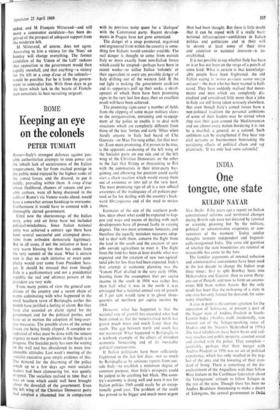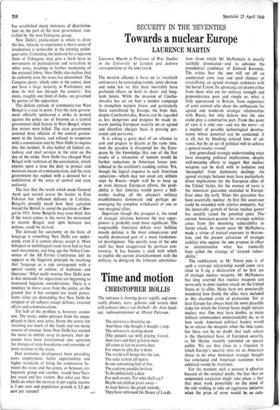One tongue, one state
INDIA KULDIP NAYAR
New Delhi—Fifty years ago a report on Indian constitutional reforms said territorial changes during British rule were not dictated by rational or scientific planning but 'by the military, political or administrative exigencies or con- veniences of the moment.' Today similar thoughts torment independent and linguisti- cally-reorganised India. The same old question of whether the state boundaries are rational or reasonable has come to the fore.
The familiar arguments of internal cohesion and administrative convenience have been used in the last decade to change the Indian map three times: first to split Bombay State into Maharashtra and Gujarat; then to carve Hary- ana out of Punjab: and now to form an autono- mous Hill State within Assam. But the only result has been that the reshaping of a state in one area has only fanned the demands for auto- nomy elsewhere.
A case in point is the current agitation for the separation of Telengana, at present a part of the bigger state of Andhra Pradesh in South- Eastern India. (Andhra itself, incidentally, was formed out of the Telugu-speaking areas of Madras and the Nizam's Hyderabad in 1956.) The local inhabitants have burnt buses and rail- way coaches and public property, courted arrest and clashed with the police. They complain— justifiably, perhaps– that their merger with Andhra Pradesh in 1956 was an act of political expediency, which has only resulted in the neg- lect of the area and the lowering of their stan- dard of living. There is something of the dis- enchantment of the Anguillans with their fellow West Indians in the Caribbean federation about the Telenganans' attitude to fellow Telugus in the rest of the state. Though there has been no Andhra Bradshaw threatening to make a desert of Telengana, the central government in Delhi
has established many instances of discrimina- tion on the part of the state government, con- trolled by the non-Telengana group.
New Delhi's predicament is where to draw the line. Already its experience is that a sense of irredentism is noticeable in the existing unilin- gual units. Conceding the demand for a separate State of Telengana may give a fresh lease to movements of particularism and revivalism in other areas, resulting in further weakening of the national fabric. New Delhi also realises that its authority over the states has diminished. The Congress party, which rules at the centre, does not have a large majority in Parliament, nor does its writ run through the country : five states, roughly one third of India, are governed by parties of the opposition.
The defiant attitude of communist-run West Bengal is a case in point. First the state govern- ment officially sponsored a strike in protest against the police use of firearms at a central government shell factory in West Bengal, where five rioters were killed. The state government arrested three officials of the central govern- ment at the factory, and refused to cooperate with a commission sent by New Delhi to inquire into the incident. It also halted all federal air, railway and mail services in the state on the day of the strike. Now Delhi has charged West Bengal with violation of the constitution, which enjoins upon a state the duty to protect and maintain means of communication, and the state government has replied with a demand for a redefinition of the areas of central and state authority.
The fact that the revolt which made General Ayub quit started across the border in East Pakistan has inflamed defiance in Calcutta; Bengalis proudly recall how their agitation forced the British to annul the partition of Ben- gal in 1911. Some Bengalis may even think that if the worst comes to the worst the movement to reunite Bengal, now split between two nations, could be revived.
The demand for autonomy on the basis of language is something New Delhi can under- stand, even if it cannot always accept it. Most bilingual or multilingual states have had to face such movements, and long ago the Nehru Com- mittee of the All Parties Conference lent its support to the linguistic principle by resolving that 'language as a rule corresponds with a special variety of culture, of traditions and literature.' What really worries New Delhi now is that demands for separatism are beginning to transcend linguistic considerations. There is a tendency to move away from the centre, on the ground that it has usurped too much power. Some states are demanding that New Delhi be stripped of all subjects except defence, external affairs and communications.
The hub of the problem is, however, econo- mic. The states, under pressure from the unem- ployed in their own areas, blame the centre for retaining too much of the funds and too many sources of revenue. Since New Delhi has resisted the move to whittle away its powers, their de- mands have been transformed into agitation for changes of state boundaries and surrender of more revenue to the states.
Had economic development been providing more employment, better opportunities and higher standards of living the controversy be- tween the states and the centre, or between one linguistic group and another, would have been less vocal and less violent. But what can New Delhi do when the increase in per capita income is 3 per cent and population growth is 2.5 per cent per annum?











































 Previous page
Previous page